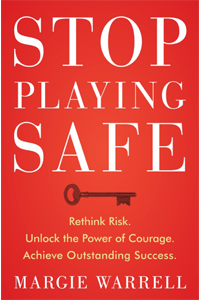Avoiding a difficult conversation? 7 keys to speaking up about things that weigh you down

We’ve all been there – feeling upset, resentful, frustrated, hurt or ‘all of the above’ with someone but loathe to say anything lest it be awkward, uncomfortable, or worse… turn into an ugly confrontation. For many people, they can think of little worse!
But here’s the deal: issues that don’t get talked out get acted out in all sorts of destructive and unpleasant ways. As they do they not only exact a steep toll your peace of mind, but can really undermine your relationships and limit your career.
Your ability to speak up about the issues that weigh you down is not only crucial to your success at work, but to your happiness in life. As I wrote in Stop Playing Safe and shared in my recent TV interview below, the quality of your relationships is determined by the quality of the conversations you have in them. Too often though we play safe and avoid the possibility of an awkward conversation — too raw, too difficult, too sensitive, too risky, too uncomfortable, too much effort.
Of course, it’s possible you are very brave in your conversations and never tip toe around issues. But more likely, there are conversations that you aren’t having that, if you did, would serve you (and many others) in some way.
As awkward as it can be to speak up about sensitive issues (particularly when the stakes seem high), the cost you ultimately pay for saying nothing far exceeds any discomfort in speaking up. So that end, here are 7 keys to speaking up about those things that weigh you down to produce better outcomes for all.
1/ Start with heart. Before you enter into a conversation ask yourself the highest intention you are hoping to serve. Words that come from the heart (even if not expressed as articulately as you’d like) land on the heart.
2/ Set the tone. Be intentional about setting the emotional tone for the conversation from the outset. Positive but honest; candid but caring. If they start to get upset, don’t react. Be the change you’d like to see in them.
3/ Hear their story. If you are talking about a sensitive issue where opinions may differ, take time up front to understand where the other person is coming from. When someone feels you have genuinely tried to understand their perspective, it makes them much more receptive to hearing yours. Listen beyond what’s being said, to the story they have about the situation, acknowledging their emotions as legitimate and treating them with dignity every step of the way.
4/ Facts first. When you present your opinion as they truth you are guaranteed to get others offside. So separate out the facts of a situation from your opinion of those facts. Be sure to have some recent and relevant examples or facts to support your stance.
5/Avoid stone throwing. Engaging in a difficult situation isn’t about ‘winning. So don’t get dragged into a slinging match about what woulda-shoulda-coulda happened. Things are as they are. Perhaps mistakes have been made (and not just by them.) Thinking a back to your highest intention, if you are about making another person wrong, then you will never get an optimal outcome.
6/ Stay future focused. Focus on the future you want to work toward. What would be an ideal outcome given where things are today. Enlist their support in working wit you to arrive at a better place in the future, both everyone’s sake.
7/ Clarify commitments. As the conversation draws to a close, to sure to clarify the commitments you are both making to addressing the issues at hand. Exactly what will be done differently, by whom, on what timeline? If you haven’t reached an agreement then at least agree to staying in conversation and ask them if there is anything you can do to help make that easier for them.
While no one conversations is guaranteed to change the course of your relationships, career or life, any single conversation can. They are that powerful! So no matter how averse to confrontation, cowardly, timid or tight-lipped you have been in the past, I encourage you to lay your vulnerability on the line and engage more courageously in conversation with those around you. I promise you, as awkward as it may feel, the benefits will far outweigh the temporary discomfort. So go on, be brave!
 EXTRA RESOURCES TO HELP YOU HAVE COURAGEOUS CONVERSATIONS: If you’d like some reading on how to engage more bravely in conversation, then get your hands on a copy of Stop Playing Safe or Find Your Courage. Both books will help you to say what needs to be said in ways that people can hear it. You can also read some articles I’ve written on the links below.
EXTRA RESOURCES TO HELP YOU HAVE COURAGEOUS CONVERSATIONS: If you’d like some reading on how to engage more bravely in conversation, then get your hands on a copy of Stop Playing Safe or Find Your Courage. Both books will help you to say what needs to be said in ways that people can hear it. You can also read some articles I’ve written on the links below.


